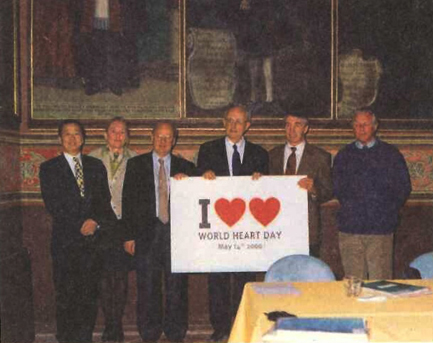Editorial
← vista completaPublished on March 17, 2017 | http://doi.org/10.5867/medwave.2017.02.6883
The World Heart Day prompts an Ibero-American collaboration
Colaboración íbero-americana en Medwave a propósito del Día Mundial del Corazón
Non-communicable diseases are the leading cause of total morbidity and mortality in the world and Ibero-American too, comprising mainly cardiovascular diseases. cardiovascular diseases cause approximately 17.5 million deaths annually (46% of all deaths are due to Non-communicable diseases), and 6 million of these deaths occur prematurely in people between 30 and 70 years old [1],[2],[3],[4].
Ibero-American health statistics has several contrasts, determined by the socio-economic and health systems development of each region [4]. However, the old stereotype of cardiovascular diseases affecting only stressed, overweight middle-aged men from developed countries no longer applies. For example, life expectancy in Chile and Haiti are 80.5 and 63.5 years, respectively, but the percentage of premature mortality due to Non-communicable diseases in Haiti is double than in Chile (23.9% vs. 11.9%, respectively) [4]. The combined burden of Non-communicable diseases and communicable diseases are rising faster among lower-income countries and communities, where they impose large, avoidable costs in human, social and economic terms.
Unfortunately, cardiovascular diseases had a low priority on the global health agenda until few years ago [5],[6]. The excellent scenario of the Millennium Goals was missed in order to advance in the strategies of the cardiovascular diseases prevention [7]. In this sense, it is important to highlight the first great global initiative: the celebration of the World Heart Day in 2000, under the auspices of the World Heart Federation [8].
After 17 years of this strategy led by the World Heart Federation during the presidency of Dr. Bayes de Luna (see Figure 1) [8], the burden of cardiovascular diseases has not changed significantly; mainly because cardiovascular prevention depends on multiple bio-psycho-social factors and the long-term adherence to medical advice are often low.1 It is also necessary to alert, the increased attributable deaths trend to obesity and diabetes mellitus, two pathologies closely related with the globalization of the "diabetogenic environment" (high consumption of sugars and saturated fat, and sedentary lifestyle) [1], [9].

Figure 1. Members of the World Heart Federation. In 2000 they approved the "World Heart Day" campaign in the city of Vic, Spain. From left to right: Tak-Fu-Tse, Marianne Burle de Figueiredo, John Chalmers; Antoni Bayes de Luna; Darwin R Labarthe and Leslie Busk.
Today, global awareness about the burden of the cardiovascular diseases is better and there are several international projects related to cardiovascular prevention, such as HEARTS. This project, sponsored by the World Health Organization, the World Heart Federation, the Pan American Health Organization, the World Stroke Organization, the Center for Disease Control and Prevention, the World Hypertension League and the International Society of Hypertension, proposes the intervention on six key aspects: (a) Healthy lifestyle, (b) Evidence-based treatment protocols, C) Access to essential medicines and technology, d) Risk-based management, e) Team care and task-sharing, and f) Systems for monitoring [10].
In this sense, we welcome the international initiatives focused on health providers. Improving medical competence and performance are key aspects of cardiovascular prevention [1]. Precisely, Medwave journal proposes a full cardiovascular issue, [11] with interesting papers about various topics such as dyslipidemia [12], hypertensive crisis [13], syncope [14],[15], diabetes mellitus [16], heart failure [16],[17], aortic stenosis [18], coronary artery disease [19], cardiomyopathies [19], arrhythmias [20],[21] and risk scores [22]. Some of these reviews highlighted the value of the new non-invasive imaging techniques [18],[19] and the "rejuvenated" electrocardiogram [15],[21] from Einthoven, to improve cardiovascular risk assessment.
Finally, we would like to extend our gratitude and to recognize the enthusiasm and professionalism of the authors of this cardiovascular issue and the Medwave journal team, to contribute to this new World Heart Day project.
Notes
From the editor
The authors originally submitted this article in Spanish and subsequently translated it into English. The Journal has not copyedited this version.
Declaration of conflicts of interest
The authors declare that they have no potential conflicts of interest with the topic addressed in the article.

